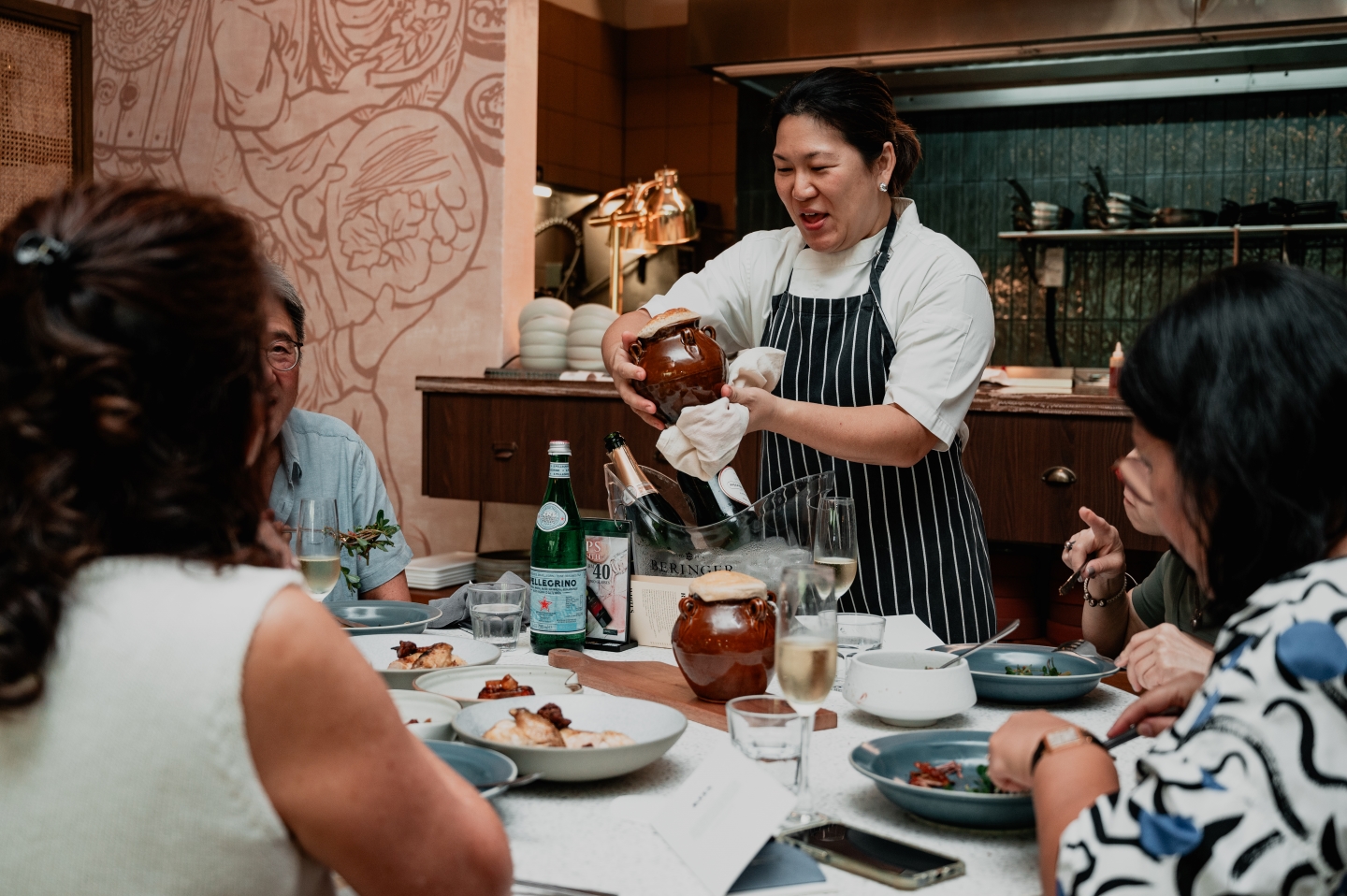
Yong preparing to serve guests her seafood dish in tajau pots (All photos: Kita Food Festival)
In Kadazandusun folklore, divine beings Kinoingan and Sumundu once ruled the heavens and the earth. They had a greedy son, Ponompulan, who, envious of his father’s power and authority, set about causing misery, sickness and death. He influenced people, and they too became bent towards evil.
Disappointed and angry, Kinoingan banished his son to Kolungkud, the underworld, and sent famine and plagues to punish mankind. As earth became debilitated, its people sought forgiveness. Kinoingan’s only daughter Ponompuan, the most beautiful maiden in all the lands, entreated her father to pardon man, offering herself up as a willing sacrifice so they would survive.
From her body parts came a variety of food. Her head turned into coconut, her teeth and hair into maize, her toes ginger, and from her flesh and blood flowed rice. By the time she breathed her last, her soul had become the Bambarayon spirit, which dwells in paddy. She was henceforth known as Huminodun, meaning “the transformed sacrifice”.
Passed down through generations, the tale forms the crux of the harvest festival Kaamatan and sheds light on the sacred relationship indigenous groups have with their food. Rice is not only a staple ingredient, but also a precious one, and it is therefore considered unbecoming and offensive for anyone to waste the treasured grain.
One of the reasons Leisa Tyler and Darren Teoh co-founded Kita Food Festival was to build a platform where the exchange of knowledge on sustainable food practices can take place.
“We live in an era of consumption that’s getting out of hand. We should have a discussion on what the impact of our decisions is going to be like. At the moment, I don’t think there’s a forum for that, particularly in our [F&B] industry. We don’t have influence over consumers directly, but we can have influence from within. If we are able to make incremental changes on a daily basis, we’ll arrive at a point that is a lot better than we are right now,” says Teoh, whose two Michelin-starred Dewakan in Kuala Lumpur recently earned a Green Star for its commitment to sustainabillity.
kff-2679.jpg
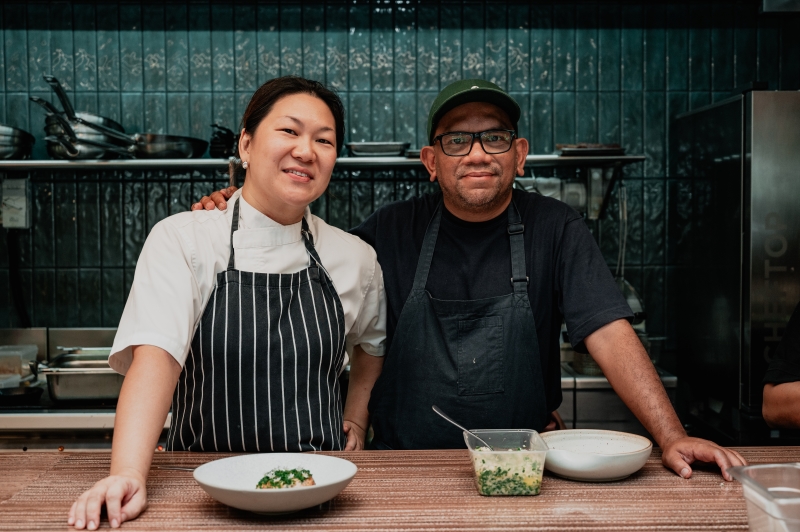
The festival’s first foray into Sabah took place over a weekend in October, with collaboration menus across town, big barbecue and a condensed version of Kita Conversations held at Hyatt Centric Kota Kinabalu.
Ray Adriansyah of Bali’s Locavore NXT flew in to partner up with Linn Yong of Limau and Linen for a four-hands brunch at the latter’s newly relocated restaurant. With both being strong advocates of local produce, the duo conceptualised a menu that pays tribute to community spirit, highlighting the bountiful harvest from fishermen, farmers and artisanal food producers.
“You know, in KL, we say ‘yam seng’, but in KK, we say ‘aramai ti’. But it’s more than a phrase to toast to. You’re calling people to come together. And when you’re together, that’s where joy is,” says Yong, who moved from Johor to Sandakan after getting married. The Dusun term is generally used for merrymaking, when it is time to make new friends and renew old bonds.
She lists the suppliers who contributed to the spread at brunch. The quail is from Universiti Malaysia Sabah Sandakan; the rose marmalade from DumoWongi, a social enterprise by a community of female farmers up in Kundasang; and the Rongguol rice, an unpolished red heirloom variety, is from another social enterprise, Wagas Dati.
“Most people know about Bario rice, but not Rongguol. It’s one of my favourites. It’s got a nice smoky hay-like flavour, which is why I smoked the octopus as well in today’s seafood dish,” Yong explains.
The standout main was presented in traditional tajau pots, which are predominantly used to ferment tapai, or rice wine. The jar was filled with the red Rongguol, enlivened with lemongrass tapai and leftover rice lees, resulting in a texture similar to risotto, and studded with octopus and dried shellfish.
Every comforting spoonful probes one’s thoughts on how food connects, not only with a tablemate, but to a people’s history, tradition, beliefs and a way of life. This is why chefs must act responsibly when it comes to serving or reinterpreting dishes that hold great cultural value.
kff-3063.jpg
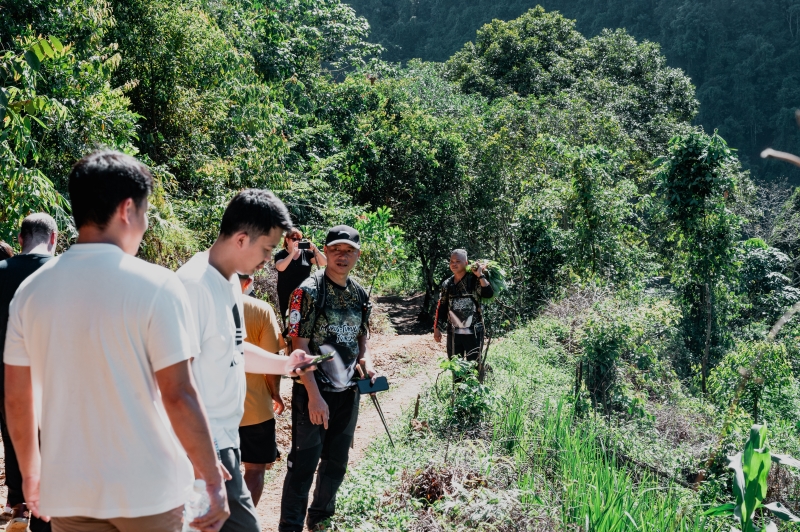
“I’m from Peninsular Malaysia and I think it’s important to understand why you should not just take something and exploit it,” shares Yong, who laments how many restaurants in KL add items like tuak (rice wine), tuhau (pickled wild ginger) and bambangan (wild mango) on menus without providing context. “Over here, food is part of culture, so I try to be as respectful as I can. When we innovate, we need to be sensitive about that sort of thing. There are times when you need to understand the origins of a product, why it’s used that way and where it comes from.”
Yong believes chefs also bear another duty. “When you understand how our future and survival are connected to the environment, it is our responsibility to educate the audience. It’s about making the message relevant to the customers.
“Sabah is known for its biodiversity and we literally have one of the last few rainforests in the world. I think programmes like Kita are super important because having these conversations is how we can level up.”
Yong says Sabah’s culinary scene is still in its infancy, which is exciting.
Bright and early the next day, Kita’s participating chefs, including Raphael Jay Peter Lee of KK fine dining restaurant Oitom, Aidan Low of KL’s Akâr Dining, Johnson Wong of Gēn Penang, Ho Jun Yip of Hyatt Centric Kota Kinabalu, Oliver Truesdale-Jutras of Folia Penang and Re:Growth Singapore, which specialises in regenerative hospitality consultancy; as well as Yong and Ray, embarked on a foraging hike up Murug-Turug, dubbed the Heaven of Waterfalls.
Following a local guide, the brigade of chefs meandered under the shade of durian, langsat, tarap and bambangan trees, crossed babbling brooks and skirted around patches of wild ginger, tapioca leaves and lemiding (a jungle fern used in soups, or better yet, instant noodles), amassing a bountiful bouquet of native herbs, fruits, mushrooms, fronds and flowers at the end of the trail.
Losing touch with nature is a common occurrence when all one does is stare at a screen all day, but when fresh air fills the lungs and the skin is dappled with sunlight, the natural connection recouples. And the overlooked shrubs and trees suddenly bear inextricable value to our well-being, for not only giving sustenance, but also keeping our natural world in order.
kita_food_festival.jpg
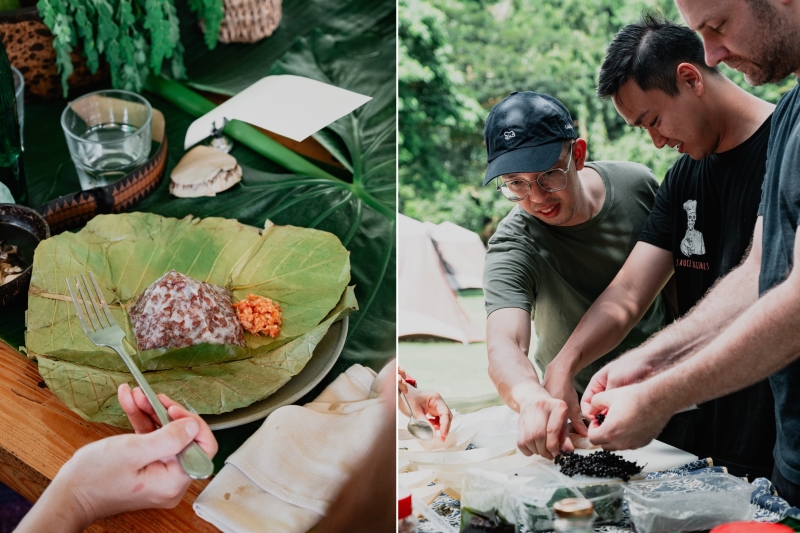
Lunch was served by the nearby Kiulu River. Yong and chef Adrian Chong of Hyatt Regency Kota Kinabalu provided each participant with a linopot, packed with a mix of Beras Keladi (black heirloom rice) and highland rice from Kota Belud with wild yam, alongside a variety of traditional pickles. Linopot is a traditional rice parcel wrapped in doringin leaves — much sturdier than banana leaves — that keep food secure when travelling long distances. It was paired with a hearty bowl of ayam pansuh, slow cooked in bamboo and rice wine, and massive salt-baked river prawns.
Going over their foraged finds, the chefs conversed about heritage, endemic ingredients and the different ways to harness the flavours of our land. Variations of the topic were expounded at the symposium later that day.
“Kita is divided into two main parts. One of them is Kita Conversations, a platform that brings F&B people together — be they a producer, farmer, food manufacturer, chef, line cook, front of house or winemaker — to talk about how the industry is like for them,” explains Tyler, who is also the founder of Weeds and More, which grows cold-climate European vegetables in Cameron Highlands.
Canadian Truesdale-Jutras reminded attendees that “what we do, cooking for others, is so intimate”. Instead of constantly looking down at the plate, chefs need to ensure staff welfare as well as their own mental health are taken care. He also advised to look upwards towards the sun, where all energy originates, and at our roles in cultivating a sustainable agriculture and F&B landscape.
Ray shared how the second chapter of his restaurant aims to solely use local produce and stop importing completely. David Lee of Ah Yen Traditional Fried Pork talked about embracing his passion for food through business and Josephine Lu of Jaws & Claws took to the stage to reinforce the quality of Sabah chocolate. Local rising stars Wong and Raphael also touched on the ways local ingredients can act as the stars of fine dining.
kff-3336_1.jpg
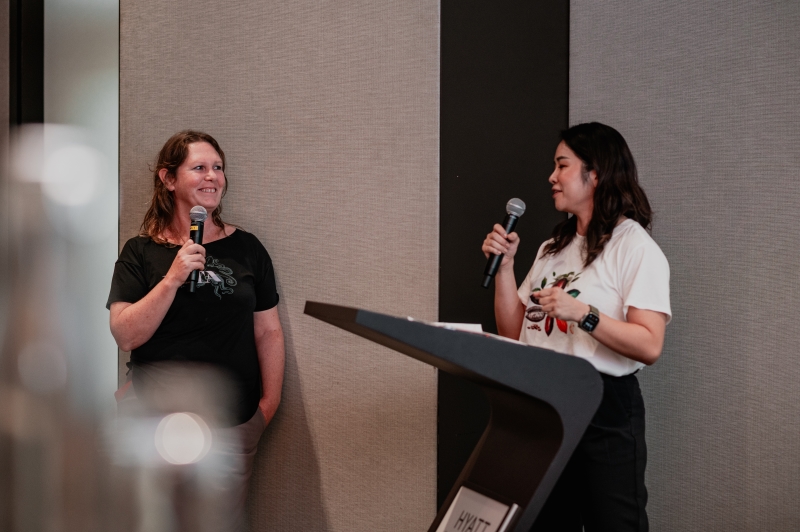
“The second part to Kita is Horizons, which is a young chef mentorship programme. We take them on this three-to-five-month journey around Malaysia to visit different farms and producers. We do workshops on food waste. And you actually see the change in them because it’s an experience you don’t often get access to. They do all these excursions, masterclasses and projects while with us,” Tyler continues. “The idea of Horizons is to get them thinking outside their comfort zones, working with new people and forming new relationships.”
Low of Akâr Dining was a previous participant, and in his four-hands collaboration with Raphael at Oitom, it was evident that the duo have the gumption to push the envelope when it comes to elevating native ingredients.
“We’re experiencing a point in time where there is a need to look outward and see what’s happening around the world, and not use that as a benchmark but as a framework to govern a thought process. That’s where we are right now,” says Teoh of his thoughts on the local F&B industry.
Tyler explains that they are moving Kita across the Causeway next year.
“In March, we’ll do the Singapore Weekender, so all the food events will happen then. But what’s new is we’re also doing something with a company called Synthesis.”
The data analytics outfit gathers information to reveal surprising evolutions in human behaviour to spot trends to come.
Tyler continues: “What they’ve done in the last two years is a self-funded research project on the future of food, looking at what we’re going to be eating decades from now when our existing food sources cannot support the volume we need. They came up with two possible scenarios: One, there’s a 30% chance that we will go back to our roots and start looking at traditional agriculture and food that grow without much encouragement, such as moringa.
“But the most likely scenario is we’ll look to technology and science to provide solutions for our challenged environment and that includes lab-grown meat and using insects as a protein source. There’s even a company in Finland, Solein, that creates protein out of air!” Tyler raves.
The festival is certainly shaping up to be a force to be reckoned with, shaking up the culinary and gastronomic worlds as we know it.
This article first appeared on Dec 2, 2024 in The Edge Malaysia.


